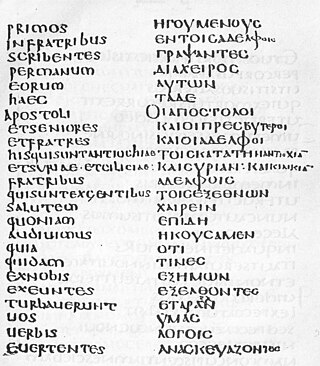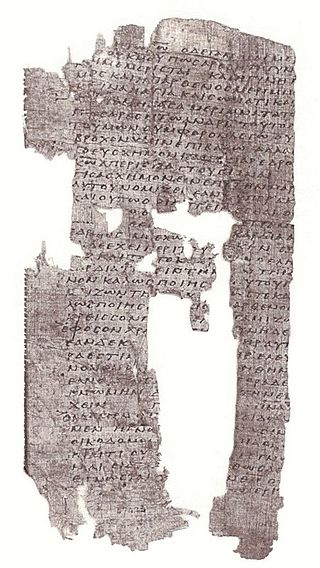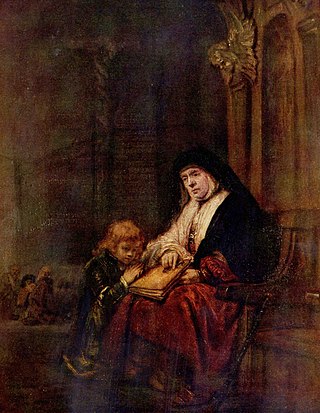
The First Epistle to the Thessalonians is a Pauline epistle of the New Testament of the Christian Bible. The epistle is attributed to Paul the Apostle, and is addressed to the church in Thessalonica, in modern-day Greece. It is likely among the first of Paul's letters, probably written by the end of AD 52, though some scholars believe the Epistle to the Galatians may have been written by AD 48.

Timothy or Timothy of Ephesus was an early Christian evangelist and the first Christian bishop of Ephesus, who tradition relates died around the year AD 97.

Elizabeth Ann Gilmour is an American child safety activist and commentator for ABC News. She gained national attention at age 14 when she was abducted from her home in Salt Lake City by Brian David Mitchell. Mitchell and his wife, Wanda Barzee, held Smart captive for nine months until she was rescued by police officers on a street in Sandy, Utah.

Meg Griffin is a fictional character in the animated television series Family Guy. Meg is the eldest child of Peter and Lois Griffin and older sister of Stewie and Chris, but is also the family's scapegoat who receives the least of their attention and tolerates the brunt of their abuse. She is often bullied, belittled, ridiculed, and ignored.

Nancy Elizabeth Lieberman, nicknamed "Lady Magic", is an American former professional basketball player and coach in the Women's National Basketball Association (WNBA) who is currently a broadcaster for the Oklahoma City Thunder of the National Basketball Association (NBA) as well as the head coach of Power, a team in the BIG3 which she led to its 2018 Championship. Lieberman is regarded as one of the greatest figures in American women's basketball.

Bethenny Frankel is an American businesswoman, television personality, entrepreneur, and author. She starred in the Bravo television series The Real Housewives of New York City, appearing in eight of its thirteen seasons since its 2008 premiere. In 2009, she founded the lifestyle brand, Skinnygirl.
The conditional preservation of the saints, or conditional perseverance of the saints, or commonly conditional security, is the Arminian Christian belief that believers are kept safe by God in their saving relationship with him upon the condition of a persevering faith in Christ. Arminians find the Scriptures describing both the initial act of faith in Christ, "whereby the relationship is effected", and the persevering faith in him "whereby the relationship is sustained." The relationship of "the believer to Christ is never a static relationship existing as the irrevocable consequence of a past decision, act, or experience." Rather, it is a living union "proceeding upon a living faith in a living Savior." This living union is captured in the simple command by Christ, "Remain in me, and I in you".

John 12 is the twelfth chapter of the Gospel of John in the New Testament of the Christian Bible. It narrates an anointing of Jesus' feet, attributed to Mary of Bethany, as well as an account of the triumphal entry of Jesus Christ into Jerusalem. The author of the book containing this chapter is anonymous, but early Christian tradition uniformly affirmed that John composed this Gospel.

Luke 23 is the twenty-third chapter of the Gospel of Luke in the New Testament of the Christian Bible. The book containing this chapter is anonymous, but early Christian tradition uniformly affirmed that Luke the Evangelist composed this Gospel as well as the Acts of the Apostles. This chapter records the trial of Jesus Christ before Pontius Pilate, Jesus' meeting with Herod Antipas, and his crucifixion, death and burial.

"Honour thy father and thy mother" is one of the Ten Commandments in the Hebrew Bible. The commandment is generally regarded in Protestant and Jewish sources as the fifth in both the list in Exodus 20:1–21 and in Deuteronomy (Dvarim) 5:1–23. Catholics and Lutherans count this as the fourth.

"Thou shalt not bear false witness against thy neighbour" is one of the Ten Commandments, widely understood as moral imperatives by Jewish, Catholic, and Protestant scholars.

Ruth is the person after whom the Book of Ruth is named. She was a Moabite woman who married an Israelite. After the death of all the male members of her family, she stays with her mother-in-law, Naomi, and moves to Judah with her, where Ruth wins the love and protection of a wealthy relative, Boaz, through her kindness.
"The Name Game" is the tenth episode of the second season of the FX anthology television series American Horror Story. The episode, written by Jessica Sharzer and directed by Michael Lehmann, originally aired on January 2, 2013. The episode is named for the 1964 song "The Name Game" which is performed by the cast in the episode. The cast version of "The Name Game" was available for purchase through iTunes. This episode is rated TV-MA (LSV).

Acts 16 is the sixteenth chapter of the Acts of the Apostles in the New Testament of the Christian Bible. It records the second missionary journey of Paul, together with Silas and Timothy. The book containing this chapter is anonymous but early Christian tradition uniformly affirmed that Luke composed this book as well as the Gospel of Luke.

1 Corinthians 4 is the fourth chapter of the First Epistle to the Corinthians in the New Testament of the Christian Bible. It is authored by Paul the Apostle and Sosthenes in Ephesus, composed between 52–55 CE. Paul continues to confront the factionalism of the Corinthian church and describes the role of an apostle.

1 Timothy 1 is the first chapter of the First Epistle to Timothy in the New Testament of the Christian Bible. The author has been traditionally identified as Paul the Apostle since as early as AD 180, although most modern scholars consider the letter pseudepigraphical, perhaps written as late as the first half of the second century AD.

1 Timothy 2 is the second chapter of the First Epistle to Timothy in the New Testament of the Christian Bible. The author has been traditionally identified as Paul the Apostle since as early as AD 180, although most modern scholars consider the letter pseudepigraphical, perhaps written as late as the first half of the second century AD.

2 Timothy 1 is the first chapter of the Second Epistle to Timothy in the New Testament of the Christian Bible. The letter is traditionally attributed to Paul the Apostle, the last one written in Rome before his death, addressed to Timothy. Some scholars argue that it is the work of an anonymous follower, after Paul's death in the first century AD. This chapter contains an opening greeting, a personal story of Paul and Timothy, and a description of the opponents they are facing.

According to the New Testament, Lois was the grandmother of Timothy. According to extrabiblical tradition, she was born into the Jewish faith, and later accepted Christianity along with her daughter Eunice.














